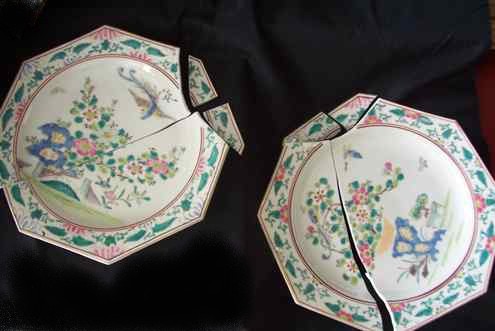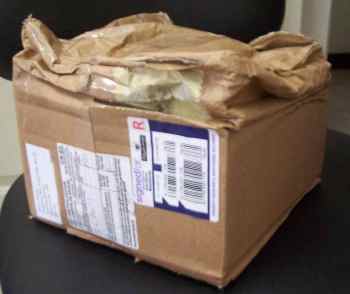Packing China
Packing china properly (or improperly) can make a porcelain
deal a success or sour it!
The responsibility of packing porcelain properly lies of course
always with the sender (=seller), not with the recipient
(=buyer) or the postal services.
Yet,
many sellers are negligent when packing their items and refuse
responsibility for this!
Example:
These plates were sent by the seller in a box filled with
crumpled paper and other improper filling materials. They were
only thinly wrapped in bubble wrap. When they arrived the
plates were touching each other and the bottom of the box. The
crumpled paper had shifted away while in transit.

Do's and dont's of packing
- Never use crumpled newspaper as filler when packing china. That is a big NO NO!!!
- Use nuggets or another light, flexible filler. But, bubble wrap alone or filler alone will never do.
- Don't use shoe boxes, liquor bottle boxes or other merchandise boxes from the supermarket or store, that consist of a single layer of cardboard.
- Consider a double box, that is a box within a box, or reinforcement of the walls of a single box.
- The box must be large enough!
- When packing china each item must be wrapped with bubble wrap to a minimum thickness of 3 cm, but 5 cm is better. It must be thick enough that you cannot feel the rim of the porcelain item!
- Distance between items and the box walls needs to be at least 5cm. The more the better.
- Styrofoam board may give additional protection, but the filler is important.
Purpose:
The wrapper protects glass and porcelain items against shocks,
but its flexibility is limited. It can be omitted only if
porcelain is embedded in soft Styrofoam formed exactly for the
items to be sent. In most cases only factories are able to do
this.
The bubbles of the wrapping sheet and nugget filling give
additional protection against knocking and may give some
resistance in case the box walls are caving in during
shipping.
The packing material must
protect (1) against shocks from knocking or falling, and (2) it
must protect against outside pressure.
Do you know how much the heaviest package your post office
allows? In some countries it is 10kg, in many it is 20kg.
If you know internal handling in the post office, or if you
have been working inside the postal system like me, then you
know what treatment parcels can be exposed to, and what weight
may be put on top of it. No wonder the boxes the post offices
sells are often very sturdy!
Consider this: for transport parcels may be stacked the full height of a rail car or postal truck. The maximum parcel weight is 10 or 20 kg, depending on the country. If your parcel has only a couple of heavy packages on top chances are that the weight adds up to 50 or 100kg. That is, if your package happens to be at the bottom of the stack.
 |
With
this weight on top there is a good chance that even a sturdy
box caves in. If that happens, only sufficient inner packing
material with flexibility, and nuggets, may provide protection
to your fragile items. |
Just when you think you have seen the worst an even worse one comes along!
Newspaper filling is a NO...NO!
Never use newspaper for packing china. Many sellers want to
save on packing material cost and just use crumpled newspapers
to fill the spaces – yes, to fill the spaces. Crumpled
newspaper may look flexible on first sight but believe me, if
it goes to the other side of the globe it provides no real
protection.
The box is rattled in the rail car or truck, it runs on
conveyor belts and over rollers in the large parcel
handling centers and airports, it must run through security
machines (x-ray, etc.), then it is transported again on runways
on other transport equipment, the same again at every other
transshipment airport.
The vibrations of all this is sufficient to flatten some of the
crumpled paper, increasing the empty space in the box. This is
the problem! Loos packaging allows that the porcelain or glass
item can slowly move nearer to the side or bottom of the box.
At the end there is NO space between box wall and item
wrapping. Danger!
Images
showing how NOT to pack ceramics and glass. Photographed
as received.
Boxes made of a single layer
of cardboard are inviting trouble. It MUST be a corrugated
cardboard box. Double layer is better than single layer. The
boxes should be very sturdy. Check the strength of post office
boxes (not valid for post of Thailand and the US Postal Service,
they have soft boxes). This is the minimum strength for
sending fragile items.
Again, the homemade packing method of using crumpled newspaper
for packing china is highly unprofessional when it comes to
ceramics and glass. The longer the way to delivery the bigger
the chance that items get broken. It may be all right if you
send something a few hundred kilometers away, but when it is
shipped through the whole world the chances that it arrives
intact are small.
In my experience sellers in Japan also notoriously use unsuitable packaging. Boxes are often not big enough, so the bottom or top of the ceramic item may be packed in a way that it touches the bottom or top of the box. And the use of newspaper is more the rule than the exception, unfortunately. That may be sufficient when shipping within Japan, but when shipping internationally it often means items will arrive broken.
How you should pack...
When wrapping porcelain in bubble wrapping foil, test whether you can feel the edge of the item (e.g. plate rim) through the wrapping. If you can, then the wrapping is insufficient.
There should always be a space of at least 3cm on all sides, top and bottom, in the box, which should be stuffed with nuggets or similar material. And I mean 'stuffed'! Loose fillings do little to help protect items within. It must be kept in position all the time during transit.
Go
from Packing China to Shipping Porcelain
Return
to Antique Chinese Porcelain Home Page
